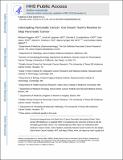Intercepting Pancreatic Cancer: Our Dream Teamʼs Resolve to Stop Pancreatic Cancer
Author(s)
Jacks, Tyler E
DownloadAccepted version (282.7Kb)
Terms of use
Metadata
Show full item recordAbstract
During its inaugural year, the Stand Up to Cancer Pancreatic Interception Dream Team kicked off initiatives in a targeted effort to revolutionize the outcomes of those at risk for developing pancreatic cancer. Our multidisciplinary effort spans six institutions (MD Anderson Cancer Center, Johns Hopkins University, Moores Cancer Center UC San Diego, Dana Farber Cancer Institute, MIT, and Mayo Clinic). Here, we report our team’s goals and objectives and how we hope to revolutionize the outcomes of those at high risk for developing pancreatic cancer. “Cancer interception,” a dynamic phrase coined by Nobel Laureate Elizabeth Blackburn, is defined as identifying cancer at its earliest, pre-invasive stages through advanced screening, and then offering treatments with drugs and vaccines in order to halt its progression.1 This phrase distinguishes between active versus passive preventive interventions (e.g., not smoking, avoiding carcinogen exposure), but does not confer primacy of one modality over the other. Unfortunately, there is no established interception point for pancreatic cancer which is often diagnosed after it has metastasized and there is no suitable screening test to apply to the general population. Pancreatic ductal adenocarcinoma (PDAC) is one of the deadliest types of cancer with a 5-year survival rate of only 9% with limited preventive and therapeutic options. While risk avoidance interventions to improve overall public health such as smoking cessation, exercise, and healthy diet are important, active cancer interception remains a fairly nascent concept for this lethal disease. Currently, there is no effective test to screen the general population for PDAC. However, cancer interception has great potential to improve outcomes for patients at risk for developing PDAC.
Date issued
2018-11Department
Massachusetts Institute of Technology. Department of Biology; Koch Institute for Integrative Cancer Research at MITJournal
Pancreas
Publisher
Ovid Technologies (Wolters Kluwer Health)
Citation
Goggins, Michael et al. “Intercepting Pancreatic Cancer: Our Dream Teamʼs Resolve to Stop Pancreatic Cancer.” Pancreas, vol. 47, no. 10, 2018, pp. 1175-1176 © 2018 The Author(s)
Version: Author's final manuscript
ISSN
0885-3177